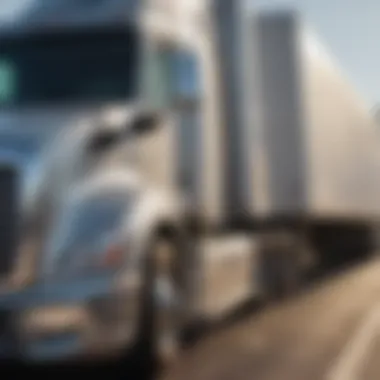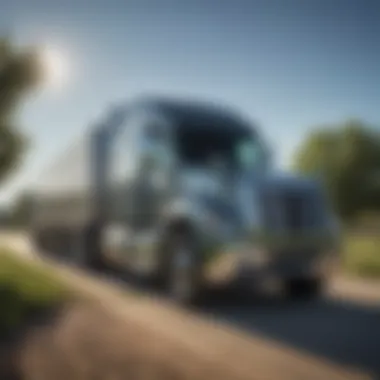Exploring Freightliner: Innovation in Trucking


Intro
Freightliner, a significant player in the trucking industry, has its operations centered in Wichita, Kansas. This city plays a crucial role in shaping the future of transportation through innovation. By focusing on the local economy, driver training, and advancements in truck technology, Freightliner provides a vital service. This article will explore these aspects in detail, providing readers insight into how the company influences the region and the industry at large.
Topic Overview
Freightliner is well-known for its heavy-duty trucks, which are fundamental in various sectors, including agriculture and logistics. The importance of this company lies not only in its product but also in its contributions to the economic fabric of Wichita.
Definition and Importance
The term "Freightliner" refers to a brand that specializes in the manufacturing of commercial vehicles, particularly trucks. These vehicles are essential for transporting goods across the nation. The significance of Freightliner extends beyond its production; it enhances local entrepreneurship and supports jobs in maintenance services and logistics.
Brief History and Evolution
Freightliner’s story began in the late 20th century. Originally focused on medium-duty trucks, it evolved into an industry leader with the introduction of innovations like aerodynamic designs and fuel-efficient engines. The Wichita plant became operational in the 1980s, instilling local resources into the broader framework of transportation solutions. Since then, it has marked milestones in productivity and sustainability, making it a pivotal fixture in truck manufacturing.
Key Techniques and Innovations
Freightliner stands out in adopting cutting-edge techniques and innovative practices.
Sustainable Manufacturing Practices
Sustainability is at the core of Freightliner’s operations. The Wichita facility implements rigorous environmental standards. By utilizing recyclable materials in production, the company minimizes waste. Moreover, energy-efficient processes contribute to a reduction in overall carbon footprints.
Advanced Trucking Technologies
Technological advancements define modern freight solutions. Key innovations include:
- Autonomous Driving Features: These systems enhance safety and efficiency on the road.
- Telematics Solutions: Freightliner's smart tech provides real-time data, allowing for better route planning and vehicle management.
Practical Applications
The application of Freightliner's practices can be observed in various scenarios, including drivers' training and operation efficiency.
Step-by-Step Guides
To optimize trucking operations, drivers and fleet owners can follow systematic approaches:
- Regular Maintenance: Incorporate routine checks to ensure vehicle stability.
- Data Monitoring: Utilize Freightliner’s telematics to assess performance consistently.
- Training Programs: Participate in available training courses to improve operational skills.
Case Studies or Real-World Examples
Several local businesses have thrived due to Freightliner’s influence. A case study featuring a regional logistics company shows a significant decrease in delivery times after integrating Freightliner trucks. Efficiency improved by 30%, showcasing how technology and reliable service backed by Freightliner create tangible results.
"Freightliner not only builds trucks; it builds the foundation for a robust logistic ecosystem."
The role of Freightliner in Wichita transcends mere production. With an eye on innovation and community welfare, the company excels as an example of excellence in the trucking industry. Understanding its mechanisms and contributions offers great value to stakeholders involved in agriculture and logistics.
Overview of Freightliner
Freightliner is a prominent name in the trucking industry, known for its commitment to innovation and efficiency. In this section, we will explore the significance of Freightliner within the broader framework of the automotive sector, particularly focusing on its operations in Wichita, Kansas. The company represents not only a manufacturing giant but also a key player in regional economic development.
Company History
Freightliner's journey began in 1942, when it was founded as the Freightliner Corporation in Portland, Oregon. Initially, the company was an outgrowth of the demand for specialized trucks for hauling freight. Over the years, it grew rapidly, acquiring a reputation for building durable and reliable trucks. In 1981, Freightliner was bought by Daimler AG, which integrated it into its global network of commercial vehicle production. This strategic acquisition allowed Freightliner to leverage international innovations and quality standards, further enhancing its market position. Today, it is recognized for producing some of the best-selling heavy-duty trucks in North America.
Headquarters and Operations
The decision to establish a major operational facility in Wichita, Kansas, has been pivotal in driving innovation. The headquarters serve not just as an administrative center, but also as a hub for research, development, and manufacturing. The presence of Freightliner in Wichita also reinforces the city's status as a key transportation and logistics center, benefiting both local businesses and the broader regional economy.


In Wichita, Freightliner operates a state-of-the-art manufacturing plant where a variety of truck models are produced. These operations emphasize efficiency and precision, ensuring that every vehicle meets rigorous standards. The facility also employs many local residents, contributing significantly to the job market. This integration of advanced manufacturing processes with local talent enables Freightliner to remain competitive in a rapidly evolving industry.
Key Models and Innovations
Freightliner has consistently been at the forefront of truck design and technology. The company’s key models, such as the Freightliner Cascadia and the Freightliner M2, have set benchmarks in efficiency and performance. The Cascadia, for instance, is known for its aerodynamic design, which contributes to fuel savings and reduces carbon footprint, appealing to a market increasingly focused on sustainability.
Innovations do not stop at vehicle design. Freightliner is also investing in advanced technology, including autonomous driving features and smart transportation systems. This focus on innovation not only enhances the driving experience but also aligns with the industry's shift towards more environmentally friendly practices.
"Freightliner operations in Wichita symbolize a commitment to both local community and technological advancement."
In summary, the overview of Freightliner outlines a company marked by a rich history, significant operational presence, and commitment to innovation. Understanding these factors is crucial as we further explore the local impact of Freightliner in Wichita.
Freightliner in Wichita: A Local Perspective
Freightliner holds a significant position in Wichita, Kansas, not just as a manufacturing hub, but as a vital player in the local economy. Understanding the influence of Freightliner on this community unveils the complexities of modern trucking and its integral role in various sectors. The operations in Wichita showcase how local industries can benefit from a major trucking company, affecting everything from employment to supply chain efficiency.
Economic Impact
The presence of Freightliner in Wichita has cultivated a wealth of economic benefits. The plant’s operations have amplified local infrastructure development. Roads, transportation systems, and supply chains have evolved as a result of Freightliner's demands and presence.
- Local Revenue Generation: The plant not only generates direct revenue through production but also stimulates local businesses that supply raw materials and parts.
- Increased Demand for Services: From maintenance services to logistics companies, the demand for auxiliary services has risen. Businesses can flourish in this supportive ecosystem.
- Tax Contributions: Freightliner makes substantial contributions to local, state, and federal taxes, which fuels public services and community projects.
Overall, the economic ripple effect created by Freightliner reverberates through many sectors, showcasing the far-reaching influence of this major corporation.
Job Creation and Workforce Development
Freightliner in Wichita is a critical source for job creation, providing thousands of positions directly and indirectly within the community. This employment boost fosters a skilled workforce that meets the needs of a changing industry.
- Diverse Employment Opportunities: The plant offers various roles, from assembly line workers to engineers, catering to a wide range of skills and experiences.
- Training Initiatives: Freightliner values workforce development by offering training programs aimed at developing skills relevant to modern manufacturing and technology. This not only benefits individuals but also enhances overall productivity and quality.
- Community Partnerships: Collaborations with local educational institutions allow for tailor-made training programs. High school students, for instance, can gain valuable experience through internships or apprenticeships, preparing them for careers in a growing industry.
"The partnership between Freightliner and local schools ensures that students have the skills needed for high-demand jobs in the trucking industry."
In summary, the job creation and workforce development strategies deployed by Freightliner not only bolster the local economy but also prepare the community for future opportunities. These factors make Freightliner a key player in Wichita’s growth, providing a strong foundation for both current and future generations.
Manufacturing Processes at the Wichita Plant
The manufacturing processes at the Wichita plant are critical to the overall efficiency and quality of Freightliner trucks. This facility stands as a testament to innovation and excellence in production. The approaches taken in manufacturing directly affect both the performance of the trucks and the operational costs for companies that utilize Freightliner vehicles. Key elements of the manufacturing process include the materials used, technology implemented, and the layout of the facility itself.
Materials and Technology Utilized
The choice of materials and technology forms the backbone of Freightliner's production capabilities. This facility predominantly uses high-strength steel and aluminum to create durable and lightweight truck bodies. These materials help improve fuel efficiency without compromising structural integrity.
Technological advancements play an essential role in the manufacturing process. Automation is heavily employed to enhance precision and speed in assembly. Robotic welding stations operate alongside skilled labor to ensure a consistancy in quality. Additionally, sophisticated software systems analyze production data to optimize workflows and reduce waste, making the process both efficient and eco-friendly.
Quality Control Measures
Quality control is vital in ensuring that every Freightliner truck meets stringent standards before leaving the plant. This includes a series of tests performed throughout various stages of the manufacturing process. The quality assurance team implements checks for mechanical components, electrical systems, and overall truck assembly.
One of the advanced methods used involves digital tracking systems that monitor parts from their initial assembly to the final product. If any irregularities are detected, corrective actions are taken almost immediately, minimizing potential issues in the future. Moreover, periodic audits are conducted to establish compliance with industry regulations, ensuring that Freightliner trucks maintain their reputation for reliability and safety.
Facility Layout and Efficiency
The layout of the Wichita plant is designed to maximize efficiency and streamline production flow. The plant is segmented into specialized areas for different manufacturing stages, including welding, painting, and final assembly. This organization reduces time spent moving materials between stages and minimizes delays.
Just-in-time manufacturing is also implemented, which means that components arrive at the assembly line exactly when needed. This strategy not only decreases inventory costs but also lowers waste.
Sustainability and Environmental Initiatives
Sustainability and environmental initiatives are increasingly critical in today's industrial landscape. For Freightliner in Wichita, these practices represent a dedication to not only innovation but also responsibility. The trucking industry stands at a crossroads, facing scrutiny regarding its environmental footprint. As a key player in this sector, Freightliner has the opportunity to lead by example.


The benefits of implementing sustainable practices are multifaceted. First, they align with a growing consumer preference for eco-conscious products. Customers are more inclined to support companies that demonstrate a commitment to sustainability. This is especially true in agriculture, where farmers increasingly seek equipment that is both efficient and environmentally sustainable.
Moreover, sustainable practices can lead to significant cost savings through improved efficiency. Renewable energy sources, waste reduction, and recycling programs can reduce operational expenses in the long run. Through responsible resource management, Freightliner enhances its competitiveness in the market while contributing positively to the environment.
Green Manufacturing Practices
Freightliner employs various green manufacturing practices that showcase its commitment to sustainability. These include:
- Use of Recycled Materials: Incorporating materials that are recycled helps to minimize waste and reduce the demand for virgin resources. This practice supports circular economy principles, wherein products are reused rather than discarded.
- Energy Efficiency: The manufacturing facilities utilize energy-efficient machinery and infrastructure. Technologies such as LED lighting and advanced heating and cooling systems contribute to a reduced carbon footprint.
- Water Conservation: Implementation of water-saving measures ensures that the production process does not excessively deplete local water resources. Technologies for water recycling and smart irrigation play vital roles in minimizing consumption.
Emission Standards and Compliance
Freightliner's commitment to sustainability also extends to meeting and exceeding emission standards. By adhering to strict regulations, the company demonstrates accountability and leadership in the trucking industry. Some key aspects include:
- Compliance with EPA Regulations: The Environmental Protection Agency sets standards that help minimize air pollution from commercial vehicles. Freightliner adheres to these regulations to ensure its trucks produce fewer emissions.
- Investment in Clean Technologies: Research and development in cleaner engine technologies, like electric and hybrid vehicles, illustrate Freightliner's forward-thinking approach to reduce reliance on fossil fuels. These innovations not only reduce emissions but also play a part in shaping the future of trucking.
"Freightliner exemplifies the integration of sustainability into the manufacturing process, ensuring a lesser impact on both the environment and communities."
- Monitoring and Reporting: Regular assessments of emission levels are conducted to ensure compliance with policies. This transparency builds trust between Freightliner and its stakeholders, including employees, customers, and the communities in which it operates.
Community Engagement and Support
Community engagement and support is a crucial aspect of Freightliner's operations in Wichita. This mutual relationship enhances not only the company's image but also its overall viability in the local market. Freightliner engages in local initiatives that promote goodwill and drive growth in the region. Supporting community programs fosters loyalty among local stakeholders and nurtures a skilled workforce aligned with the company’s vision.
Freightliner’s investments in community engagement ensure that the company remains a responsible corporate citizen. This approach contributes to social well-being, strengthens partnerships, and opens avenues for local businesses to thrive. The benefits of such engagement can be observed through the creation of a positive work environment and a robust local economy, which ultimately reflect in the company’s bottom line.
Local Partnerships and Sponsorships
Freightliner has formed numerous local partnerships that underscore its commitment to Wichita and the surrounding areas. By collaborating with local nonprofits, educational institutions, and community organizations, the company demonstrates its dedication to regional prosperity. For instance, partnerships with schools provide opportunities for students to gain insights into the trucking industry and manufacturing processes. These relationships nourish the talent pipeline, ensuring the workforce of the future is well-prepared.
The company also engages in various sponsorships that bolster local events and activities. These sponsorships not only enrich the community’s fabric but also enhance Freightliner’s visibility and reputation. Community events, such as fairs or agricultural shows, benefit from the company's support while allowing Freightliner to interact with potential future employees and local customers directly.
Community Outreach Programs
Community outreach programs are pivotal for establishing and maintaining a connection between Freightliner and the residents of Wichita. Through these programs, the company addresses specific needs within the community. Examples include workshops and training sessions focused on career development in the trucking industry. Such initiatives provide residents with valuable skills and knowledge that can lead to employment opportunities, advancing their careers.
Additionally, Freightliner participates in environmental and sustainability initiatives, which resonate strongly within the community. This includes activities such as tree planting or waste reduction programs. Engagement in these causes demonstrates Freightliner’s unwavering commitment to fostering a sustainable future for all.
Freightliner’s efforts in community outreach not only aid in addressing local needs but also enrich the social fabric of Wichita.
"A company that invests in its community is a company that invests in its future."
Overall, the commitment to community engagement and support illustrates Freightliner's role as not just a manufacturer of trucks but as a vital member of the Wichita community.
Training and Development for Drivers
Training and development for drivers are central to the success of Freightliner and the trucking industry as a whole. In a landscape where efficiency, safety, and technology are paramount, adequately trained drivers are critical. As the automotive sector evolves, so too do the skills required to navigate increasingly complex vehicles and logistics systems.
Benefits of Driver Training
Investing in driver training programs produces various advantages that reverberate throughout the trucking industry. Trained drivers demonstrate higher levels of safety on the road, directly correlating with reduced accident rates and lower insurance costs. This not only enhances public perception but also protects the company's bottom line.
Furthermore, well-trained drivers are often more productive. They understand how to operate vehicles efficiently and make better decisions that lead to timely deliveries. From the perspective of freight companies, this translates into increased profitability and competitiveness in the market.
Another significant aspect is compliance with regulations. The trucking industry is tightly regulated, with numerous federal and state requirements. Training programs equip drivers with the knowledge necessary to navigate compliance issues confidently, thus minimizing legal risks for the company.
Considerations in Driver Development
While the importance of training is evident, there are several factors that should be taken into account. First, training programs need to be adapted to meet the demands of new technologies. Advanced driver-assistance systems (ADAS) and other high-tech features in modern freight vehicles require specific skill sets that can only be cultivated through ongoing education.


In addition, economic factors often influence the availability and structure of training programs. For instance, companies may face budget constraints that limit their capacity to invest in high-quality training. Thus, balancing cost and quality is a constant challenge.
Professional Driver Training Programs
Freightliner offers comprehensive professional driver training programs to ensure that its drivers are among the best in the industry. These programs cover various essential skills necessary for modern operations.
- Onboarding Process: New drivers typically undergo an extensive onboarding process that includes both theoretical and practical training. They learn about the specific technologies in the vehicles, safety protocols, and company policies.
- Simulated Training: With technological advancement, many programs incorporate simulated driving experiences. This allows learners to face various driving scenarios without the risks associated with real-world driving.
- Continuous Learning Opportunities: Beyond initial training, drivers have access to ongoing education. Regular workshops and refresher courses keep skills sharp and up-to-date with current industry standards.
Safety Standards and Protocols
Safety is a critical focus in every aspect of the trucking industry. Freightliner maintains high safety standards and protocols that drivers must adhere to. The significance of these standards cannot be overstated, as they protect both the driver and the public.
"A well-trained driver is not only an asset to a company but a safeguard for everyone on the road."
Implementation of Safety Protocols
Freightliner employs several key strategies in their safety programs, including:
- Regular Safety Audits: Ongoing safety audits and evaluations ensure compliance with internal and external standards. These assessments identify potential risks and areas for improvement.
- Emergency Protocols: Clear guidelines on how to handle emergencies provide drivers with actionable steps to take during critical situations.
- Behavioral Training: Understanding human factors in driving behavior is essential. Programs focus on developing decision-making skills, such as how to react under pressure.
By fostering a culture of safety through rigorous training and adherence to protocols, Freightliner not only enhances operational effectiveness but also underscores its commitment to the well-being of its drivers and everyone else on the road.
Challenges in the Trucking Industry
The trucking industry faces multiple challenges that impact its operations and the broader economy. Understanding these challenges is critical as they delineate the landscape within which Freightliner operates and innovates. By examining the key issues—such as driver shortages and regulatory compliance—we can grasp the complexities that influence not just Freightliner but the industry as a whole.
Driver Shortages
Driver shortages have emerged as one of the most pressing issues in the trucking sector. With an aging workforce, many truck drivers are retiring, leading to a significant gap in the available labor force. Factors contributing to this issue include:
- Working Conditions: Long hours and time away from home deter many potential drivers.
- Compensation: While pay has increased in some areas, it still does not always meet the expectations of new drivers.
- Training and Licensing: The rigorous process to obtain a commercial driver's license can discourage new entrants into the field.
The shortage of qualified drivers directly affects logistics, delivery times, and overall efficiency in the freight transportation process. For companies like Freightliner, investing in training programs becomes essential. By developing a skilled workforce, Freightliner can help mitigate this crisis and secure its operational capabilities.
Regulations and Compliance
Regulations in the trucking industry are complex and ever-changing. Companies must navigate a maze of federal, state, and local regulations. For Freightliner, compliance with these regulations is crucial not just for operational integrity but also for maintaining a good public image. Key considerations include:
- Safety Standards: Adherence to safety regulations is non-negotiable. Violations can lead to fines and damage to reputation.
- Environmental Compliance: Regulations regarding emissions require constant innovation in order to meet standards without sacrificing performance.
- Driver Hours of Service Regulations: These rules are in place to ensure driver safety, but they also affect delivery schedules and operational efficiency.
Successfully managing regulations allows Freightliner to focus on innovation while ensuring responsible practices that benefit the overarching community and industry.
"The trucking industry is at a critical juncture, balancing the need for innovation with the realities imposed by regulations and labor shortages."
Future of Freightliner in Wichita
The future of Freightliner in Wichita stands as a pivotal topic, reflecting not only the company's ongoing evolution but also its essential role in shaping the regional economy and the trucking industry as a whole. This section engages with upcoming innovations, expansion opportunities, and their implications for stakeholders within and beyond the logistics sector. The progression of Freightliner in Wichita represents a case study in resilience and adaptive change, serving as a benchmark for future developments in truck manufacturing and technology.
Ensuring that Freightliner remains a leader in the trucking industry necessitates an investment in technology and infrastructure. These developments can improve efficiency, reduce operation costs, and align with environmental expectations. As such, stakeholders, from drivers to policy makers, must consider Freightliner's path forward.
Upcoming Innovations and Technologies
Freightliner evaluates and prioritizes innovations that promise not only to enhance performance but also to maintain compliance with strict regulatory standards. In terms of upcoming technologies, electric truck models are gaining traction. Freightliner is committed to investing in electric drives and hybrid systems that demonstrate effectiveness.
Implementing advanced telematics systems is also a focus. These tools help in monitoring truck health in real time, thereby optimizing maintenance schedules. This approach reduces downtime and improves overall operational efficiency.
Furthermore, Freightliner is developing automated driving solutions. This technology aims to improve safety and reduce human error on the road. The continual integration of AI and machine learning into logistics operations can lead to smarter routing and lower fuel consumption levels.
Expansion Opportunities
Freightliner has distinct opportunities for expansion that promise to reinforce its status in Wichita and beyond. By increasing production capacity, for instance, Freightliner can meet growing market demands efficiently. This expansion might also involve enhancing the manufacturing facility in Wichita, emphasizing increased automation and production speed.
The potential partnerships with tech companies focusing on logistics provide another avenue for growth. These collaborations can lead to cutting-edge innovations that keep Freightliner at the forefront of shipping technologies.
Moreover, expanding the workforce through targeted training programs is essential. It ensures that the workforce remains skilled in rapidly evolving technologies. As a result, investments in employee development are as important as physical expansion and technological advances.
"The trucking industry continues to evolve, and Freightliner in Wichita stands ready to innovate and expand, cementing its importance in logistics and local economy."



